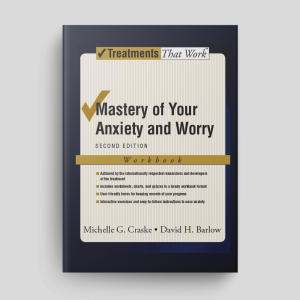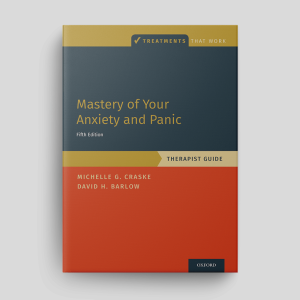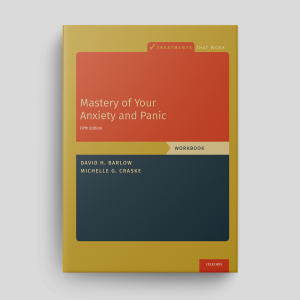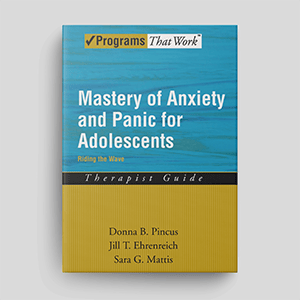Mastery Of Your Anxiety And Worry (Second Edition): Therapist Guide
Mastery of Your Anxiety and Worry provides a structured, evidence-based approach to treating generalized anxiety disorder (GAD). Based on cognitive behavioral therapy (CBT), this therapist guide equips clinicians with practical techniques to help clients manage excessive worry and anxiety effectively. A client workbook is downloadable separately.
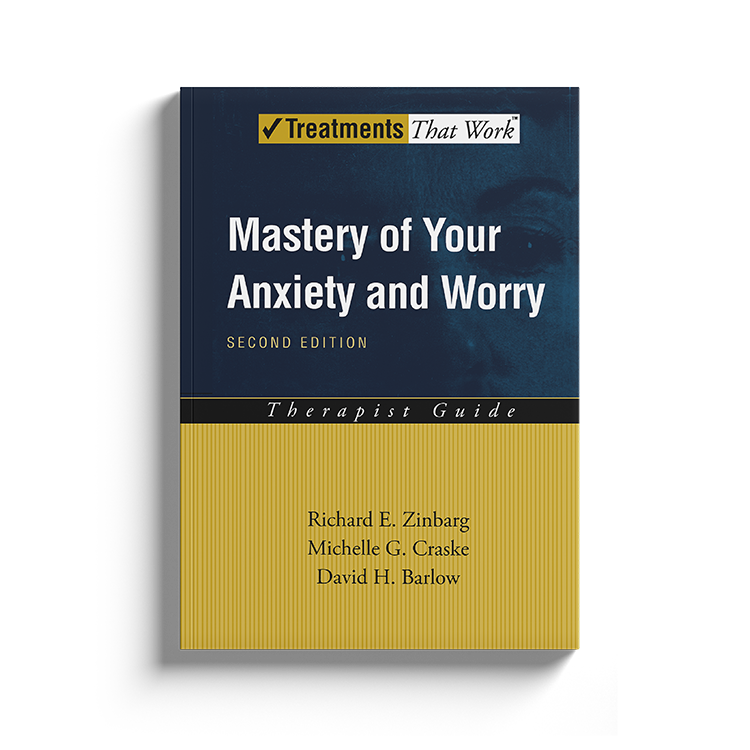
Download or send
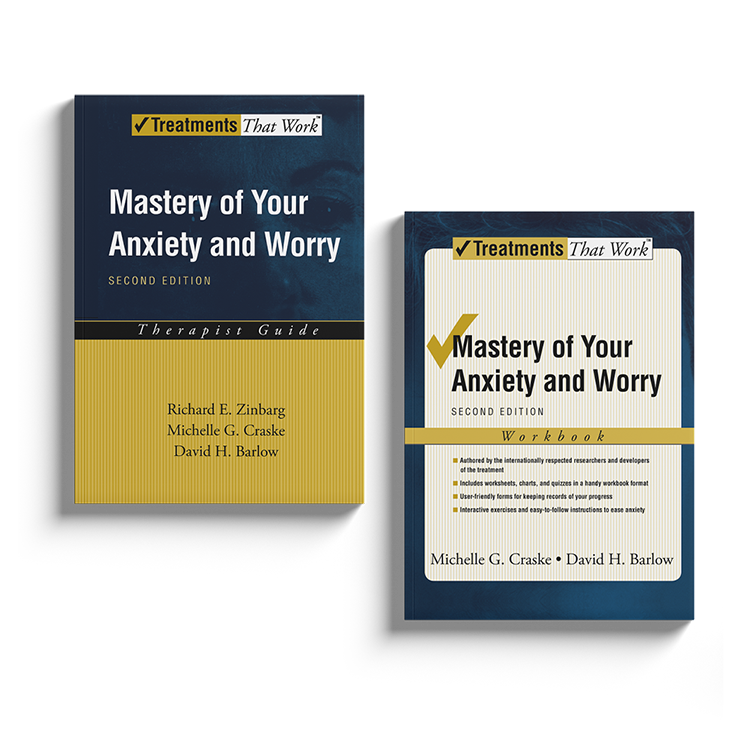
Overview
Generalized anxiety disorder (GAD) often goes underrecognized and undertreated. Developed by Richard Zinbarg, Michelle Craske & David Barlow this treatment program is designed to assist mental health professionals in delivering a structured, evidence-based intervention for clients struggling with pervasive and uncontrollable worry. The treatment is based on CBT principles and aims to help clients reduce worry, manage physiological symptoms of anxiety, and implement effective problem-solving strategies.
The Mastery of Your Anxiety and Worry guide is part of the Treatments That Work™ series and presents a program that is structured into multiple sessions, which can be delivered in individual or group formats. It integrates psychoeducation, relaxation training, cognitive restructuring, and exposure-based techniques to help clients gain control over their anxiety.
Why use this resource?
This program provides a step-by-step, structured approach for treating GAD. It includes:
- Evidence-based interventions proven effective in clinical trials.
- Practical guidance for session structure and client exercises.
- Strategies to address common challenges in treating GAD.
- Detailed explanations of cognitive-behavioral principles tailored to worry reduction.
Key benefits
Structure
Psychoeducation
Skills
Adaptability
What difficulties is this for?
Generalized Anxiety Disorder (GAD)
Persistent and excessive worry across multiple domains of life.
Integrating it into your practice
Assessment
Use structured interviews and self-report measures to diagnose GAD and track progress.
Psychoeducation
Educate clients about anxiety, worry cycles, and treatment rationale.
Relaxation Training
Teach clients progressive muscle relaxation and diaphragmatic breathing.
Cognitive Restructuring
Help clients identify and challenge unhelpful worry-related thoughts.
Exposure
Guide clients through imaginal and in vivo exposure to feared situations.
Problem-Solving
Assist clients in learning effective coping and decision-making strategies.
Maintenance
Develop relapse prevention plans to sustain treatment gains.
Theoretical background and therapist guidance
The Mastery of Your Anxiety and Worry program is based on a cognitive behavioral model of generalized anxiety disorder (GAD), emphasizing the interaction between thoughts, behaviors, and physiological responses. GAD is defined by persistent and excessive worry across multiple life areas, maintained by distorted cognitions such as overestimation of threat and intolerance of uncertainty (Dugas et al., 1998). Worry is often verbal and future-oriented, which serves to avoid emotionally charged mental imagery and physiological arousal. This process of cognitive avoidance is negatively reinforced—reducing short-term distress but maintaining anxiety in the long run (Borkovec, Alcaine, & Behar, 2004).
Treatment focuses on helping clients identify worry patterns, understand the function of worry, and apply evidence-based techniques to reduce its impact. Psychoeducation and self-monitoring promote awareness and insight. Relaxation training targets the physiological hyperarousal that often accompanies GAD, while cognitive restructuring helps clients challenge maladaptive beliefs about worry and threat (Beck, 1976; Craske, Rapee, Jackel, & Barlow, 1989). Clients are also guided through imaginal and in vivo exposure to feared situations or outcomes, which facilitates emotional processing and reduces avoidance (Foa & Kozak, 1986).
Therapists take a collaborative, structured approach, using Socratic questioning and behavioral experiments to help clients test predictions and develop more adaptive coping responses. The intervention includes relapse prevention strategies to support long-term change. Developed by Zinbarg, Craske, and Barlow (2006), the program is supported by clinical trials demonstrating its efficacy in reducing worry and improving functioning in individuals with GAD.
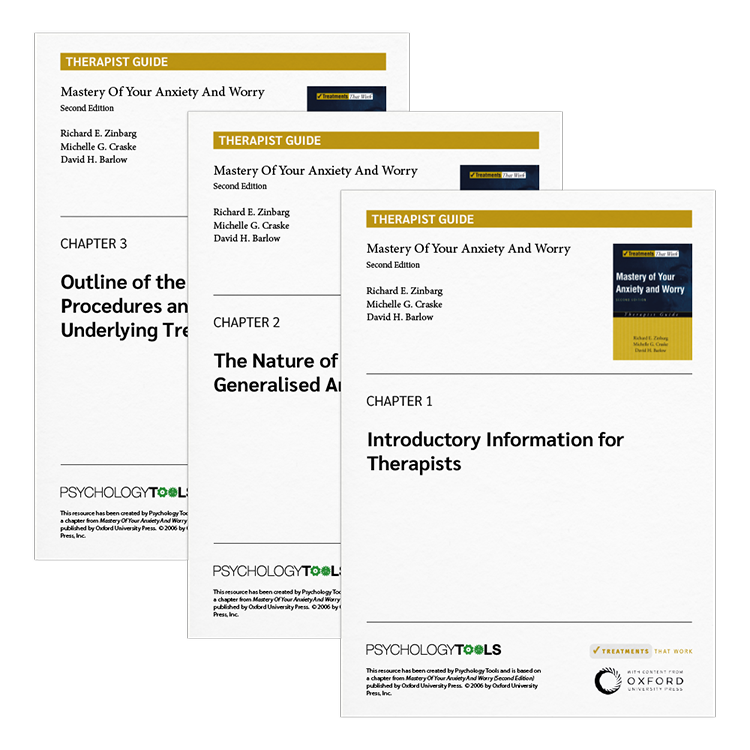
What's inside
- A structured, session-by-session treatment manual.
- Detailed guidance on cognitive restructuring and behavioral interventions.
- Relaxation and exposure techniques tailored for clients with GAD.
- Case examples and troubleshooting tips for common challenges.
FAQs
How this resource helps improve clinical outcomes
By implementing the Mastery of Your Anxiety and Worry program, therapists can help clients:
- Reduce excessive worry and improve emotional regulation.
- Develop healthier cognitive and behavioral coping strategies.
- Build confidence in managing uncertainty and stress.
- Maintain long-term gains through relapse prevention strategies.
Therapists benefit from:
- A structured framework to guide treatment.
- Research-backed interventions with proven efficacy.
- Practical tools to enhance engagement and adherence.
- A flexible resource adaptable to diverse client needs.
Clinicians who use this resource also use
References and further reading
- Barlow, D. H. (2002). Anxiety and Its Disorders: The Nature and Treatment of Anxiety and Panic. Guilford Press.
- Beck, A. T. (1976). Cognitive therapy and the emotional disorders International Universities Press.
- Borkovec, T. D., Alcaine, O. M., & Behar, E. (2004). Avoidance Theory of Worry and Generalized Anxiety Disorder. In R. G. Heimberg, C. L. Turk, & D. S. Mennin (Eds.), Generalized anxiety disorder: Advances in research and practice (pp. 77-108). The Guilford Press.
- Craske, M. G., Rapee, R. M., Jackel, L., & Barlow, D. H. (1989). Cognitive interference in generalized anxiety disorder. Behaviour Research and Therapy, 27(4), 393-398.
- Dugas, M. J., Gagnon, F., Ladouceur, R., & Freeston, M. H. (1998). Generalized anxiety disorder: A preliminary test of a conceptual model. Behaviour Research and Therapy, 36, 215-226.
- Foa, E. B., & Kozak, M. J. (1986). Emotional processing of fear: Exposure to corrective information. Psychological Bulletin, 99(1), 20-35.
- Zinbarg, R. E., Craske, M. G., & Barlow, D. H. (2006). Mastery of Your Anxiety and Worry: Therapist Guide (2nd ed.). Oxford University Press.
Just enter your name and email address, and we'll send you Mastery Of Your Anxiety And Worry (Second Edition): Therapist Guide (English US) straight to your inbox. You'll also receive occasional product update emails wth evidence-based tools, clinical resources, and the latest psychological research.
Product
Company
Support
- © 2026 Psychology Tools. All rights reserved
- Terms & Conditions
- Privacy Policy
- Cookies Policy
- Disclaimer
Working...
We value your privacy
This site uses strictly necessary cookies to function. We do not use cookies for analytics, marketing, or tracking purposes. By clicking “OK”, you agree to the use of these essential cookies. Read our Cookie Policy
